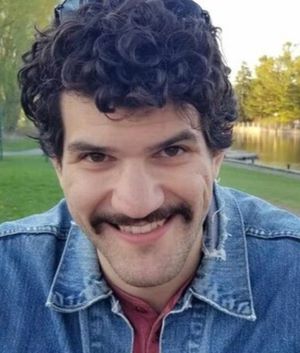FIMS News
Contact Information
FIMS Communications
Becky Blue
Email
519-661-2111x88493
FIMS & Nursing Building
Rm 2060C
Juan Escobar-Lamanna: The Video Game Industry & Accessibility for Disabled Users
 By Yuri Terra-Turgeon
By Yuri Terra-Turgeon
Juan's hometown: Toronto, Ontario
Juan Escobar-Lamanna wants his research to positively impact video game accessibility for disabled users.
---
Juan Escobar-Lamanna has turned his passion for video games into meaningful research for his PhD studies. He hopes to lead the way to a more inclusive environment where the video games, governmental policies and industry standards better reflect the population of people interested in playing them.
 “I want my research to start conversations about this stuff. Because there isn’t a lot of academic study on the issue of disability access and inclusion in the video game industry,” says Juan.
“I want my research to start conversations about this stuff. Because there isn’t a lot of academic study on the issue of disability access and inclusion in the video game industry,” says Juan.
Juan—originally from Toronto—is in the fourth year of his PhD at Western University’s Faculty of Information & Media Studies. He completed his BA in Cinema and Media Studies at York University and an MA in Contemporary Art Histories: New Media at OCAD University.
His doctoral dissertation focuses on how people with disabilities play and interact with video games and how the industry is increasingly accommodating this subset of players.
“The industry is coming up with a lot of new game settings for disabled players,” says Juan.
For example, he says there are new options coming out where the character of a particular video game will automatically navigate to the next level in certain sections of the game.
In addition to this, subtitles, screen readers, and even adaptive controllers have emerged and become more common throughout the industry.
“I also collect data on user recommendations and analyze if and how they are being implemented by developers and the industry as a whole,” he says.
Despite this progress, however, video games and the video game industry often remain an exclusionary space designed and made for non-disabled players. Ultimately, Juan hopes his research will help us better understand how disabled video game players create more accessible video games and gaming environments through the way they interact with the medium.
Juan’s most recent paper, “‘You've Got to Put in the Time': Neoliberal-Ableism and Disabled Streamers on Twitch,” which was published in Societies, examines the benefits and barriers livestreaming on the site Twitch.tv presents for disabled streamers looking to make a living from the practice.
Outside of his dissertation research, Juan is also co-organizing and co-producing a speaker series at Western entitled Conversations on Access with FIMS professors Heather Hill and Sarah Smith, which brings scholars, practitioners, and activists together to discuss issues of accessibility and disability.
Fun Fact
Juan plays the guitar and keyboard piano.
Professor Hill is also one of three doctoral advisors Juan leans on, along with Professor Jeff Preston of King’s University College and FIMS Professor Nick Dyer-Witheford. He says that he maintains a very close and collaborative relationship with all three of them.
Juan notes how he started his PhD at a difficult time—at the height of the COVID-19 pandemic—but says that his advisors and the entire faculty were very supportive of him and his research despite the difficult situation at the time.
When asked about his career goals, Juan says he wants to pursue academia or work in public policy in the field of accessibility.
“I want my knowledge to bring a positive change to the video game industry and society as a whole and make both a more inclusive place for all people.”
---
Grad student profiles in the Meet Our Students section are written by students in the Master of Media in Journalism & Communication program, who are enrolled in MMJC 9604 - Professional Writing.






